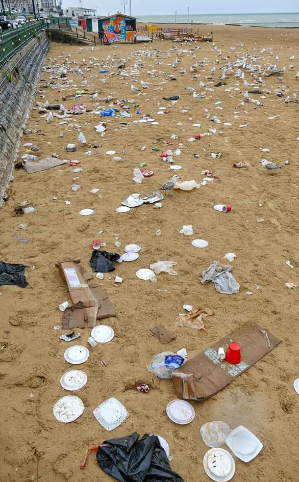A viral Reddit post shows the hazards of carelessness at the beach.
The photo — taken in 2019 in Margate, England — featured beautiful golden sand, but it was marred by garbage strewn everywhere. The poster noted the beach near their house had been spoiled by tourists.

"I honestly just can't believe how much of it there is…" one commenter said.
Another added: "What kind of monster litters on the beach? No glass, don't steal, don't litter, don't drown - all very simple, common sense rules."
Beach trash is everywhere, but a lot of messaging about the topic revolves around what washes ashore.
Litter and garbage are the most visible types of beach pollution, but nutrient pollution, sewage, and other contaminants eventually reach beaches as well. A 2017 study found 95% of plastic in the ocean comes from land.
All those toxins create health risks for humans and animals alike. There is also an economic toll, as a 2013 study by the Natural Resources Defense Council found beaches were closed or advisories were issued on 20,000 days for three consecutive years because of polluted water or threatened contamination.
"Closed beaches directly impact the economies of coastal destinations: Americans take more than 900 million trips to coastal areas and spend around $44 billion on those trips every year," the NRDC stated. "Beachside cities and economic activities associated with the ocean play a sizable role in the U.S. economy."
To cut down on trash in oceans and waterways, people will need to monitor their behavior at beaches and elsewhere. If tourists and others want to enjoy certain places, they must also be responsible and keep them clean.
Other steps include reducing consumption of single-use plastics, recycling properly, and using less or no fertilizer.
Another solution "is enforcing all aspects of the Clean Water Act, including regulations pertaining to wastewater management, stormwater pollution, [concentrated animal feeding operations] manure management, and oil and hazardous substance spill prevention and response," the NRDC stated.
One of the best ways to fix the problem, though, is to simply clean up.
"It looks like all this trash was in bags (at least one in the foreground and more black objects throughout)," one commenter said, "but if they sat around for a night then the wind and/or birds opened and spread it out again."
Another user responded: "Regardless of how it happened … we need to create less waste in the first place. If less trash exists this can't happen."
Join our free newsletter for cool news and cool tips that make it easy to help yourself while helping the planet.









